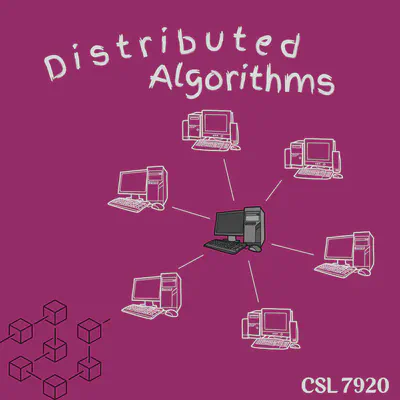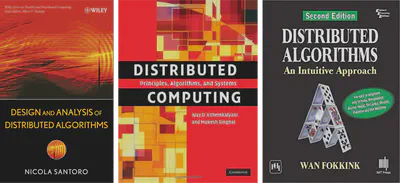CSL7920: Distributed Algorithms (Autumn 2023)

Table of Contents
Logistics
- Credits L-T-P [C]: 3-0-0 [3]
- Expectation from 7000 level course:
- 1 Contact Hr + 3 Non-Contact Hr
- Learn by Experiment/Research/Project
- Where: Room 102 CSE
- Slot: G (Tuesday 3:00PM - 3:50PM, Wednesday and Friday 2:00PM - 2:50PM)
- LMS: Moodle
- Credential: Internet ID/Password
- Easy Enrollment Code: d6m5vj
Syllabus
- Introduction to Distributed Computing Models: Model of a distributed system: asynchronous message-passing model, Time and message complexity, Safety and liveness properties, Clock Synchronization
- Leader Election Logical Clocks and Causality: Leader election in rings, Asynchronous leader election with identities, Synchronous leader election by abusing the synchronous model, Logical clocks and vector clocks, Snapshots and synchronization
- Message Ordering and Group Communication: Termination Detection Algorithms and Reasoning with Knowledge
- Distributed Mutual Exclusion Algorithms: Lamport’s algorithm, Ricart–Agrawala algorithm, and Deadlock Detection Algorithms
- Global Predicate Detection: Modalities on predicates, Centralized algorithm for relational predicates, Conjunctive predicates, Distributed algorithms for conjunctive predicates
- Distributed Shared Memory: Memory consistency models, Shared memory mutual exclusion and Wait-freedom
- Checkpointing and Rollback Recovery: Checkpoint-based recovery and Log-based rollback recovery
- Consensus and Agreement: Agreement in a failure-free system (synchronous or asynchronous), Agreement in (message-passing) synchronous systems with Failures, Agreement in asynchronous message-passing systems with failures, Wait-free shared memory consensus in asynchronous systems
- Distributed Programming Environments: Communication primitives, selected case studies
Learning Materials
Textbook

Reference Books
- N. LYNCH, (1996), Distributed Algorithms, Morgan Kaufmann, 1st Edition.
- G. TEL, (2000), Introduction to Distributed Algorithms, Cambridge University Press, 2nd Edition.
Attendance Requirement
As per the notification from academics 100% attendance is mandatory. If you have genuine reason please take leave approval as per academics rule.
Grading Policy
| Research Paper Demonstration/ Presentation | Class Quizzes (Slido) | Mini-Project |
| 15% | 10% | 10% |
| Coding/Analytical Assignments | Minors | Major |
| 20% | 10% + 10% | 25% |
Research Paper Demonstration/ Presentation
Students have to read recent research articles from a good venue. Prepare a presentation or demonstration for the whole class. The following venues can be considered:
- Conferences
- ACM Symposium on Principles of Distributed Computing
- International Symposium on Distributed Computing
- IEEE International Conference on Distributed Computing Systems
- IEEE International Parallel and Distributed Processing Symposium
- ACM International Symposium on High Performance Distributed Computing
- ACM International Conference on Distributed Event-Based Systems
- Journals
- IEEE Transactions on Parallel and Distributed Systems
- Journal of Parallel and Distributed Computing
- International Journal of Distributed Systems and Technologies
- Distributed Computing, Springer
Note that the topics must be related to the course content.
Class Quizzes (Slido)
- There will be 3-5 questions in every class.
- Topic related to the same class or the last class.
- Questions will be at the understanding level.
- 75% scores will be considered towards the grading
Coding/Analytical Assignments (Moodle)
- There will be 2 to 3 assignments mix of coding and analytical
- Expected to cover 10-12 lectures
Mini-Project
Students have to work on a mini project. Students can work in a team, however, max 2 members can be in a team. Project topics must be decided before Minor 2 and submission will be one week before the last date of class. Evaluation process will be decided later. This may include report, presentation or demonstration. Some project ideas are:
-
Scenario Simulation with Comparative Study
-
New Protocol Development
-
Changing the assumptions of existing protocol and demonstrate the change in outcome
-
There will be one special assignment for which one may need to read papers and implement the code.
Plagiarism tolerance is 7% from single source and 15% cumulative, anything more will reduce your marks as follows:
- Any logical/conceptual/formulation plagiarism: zero marks
- Other form of plagiarism (above 50%): zero marks
- Otherwise: Percentage of plagiarism will be deducted from the obtained mark